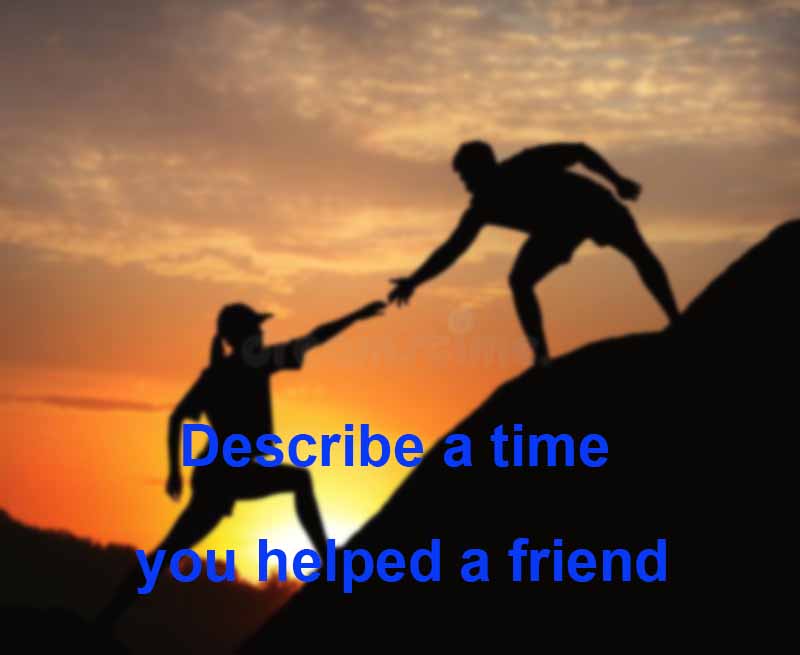“Describe a time you helped a friend” is not a tough topic, but to be able to answer this topic correctly, you need a good vocabulary and the ability to develop natural ideas.
In this article, readingielts.com will share with you sample answer topic “Describe a time you helped a friend” to help you prepare for the IELTS Speaking Part 2.
Describe a time you helped a friend
Describe a time you helped a friend cue card
You should say:
- When it was
- How you helped him/her
- Why you helped him/her
- And how you felt about it
Describe a time you helped a friend sample answer
I’d like to talk about how I helped my friend lose weight. If memory serves correctly it happened about half a year ago. At the time, my friend Lisa was upset about failing to lose weight. She knows that I managed to lose 10 kilograms in two months. So she asked me for help.
I sent my diet plan and recipes to Lisa, the ones that worked like a charm on me. The diet plan contains meat, and Lisa was really satisfied about that since she could still enjoy meat during the diet. Plus, I told Lisa that the key to losing weight is finding a companion who wants to go through the workout and diet every day with her. I suggested that she could find someone in her social circle with the same goal as her and form a team to encourage and support each other.
Lisa was totally on board with what I said. So she started a fitness team with three friends of hers. Of course, they all used my diet plan and recipes. I remember Lisa lost 5 kilograms in a month, and every member of the team lost weight more or less.
To express her gratitude for my help, Lisa treated me to a good dinner a month later. And she happily told me that she shared my method with others who want to keep fit. It gave me a sense of achievement to know that what I said was so helpful.
Some IELTS Speaking part 2 cue-cards you may like :
- (Update 2024) Describe a town or city where you would like to live in the future – IELTS Speaking Part 2 Free
- (Update 2024) Describe an item on which you spent more than expected – IELTS Speaking Part 2 Free
- (Update 2024) Describe a time when you saw two of your friends argued – IELTS Speaking Part 2
- (Update 2024) Describe an occasion when many people were smiling – IELTS Speaking Part 2
- (Update 2024) Describe a tall building in your city you like or you dislike – IELTS Speaking Part 2 Free
- (Update 2024) Describe a person who impressed you most when you were in primary school – IELTS Speaking Part 2
- (2024) Describe a person who solved a problem in a smart way – IELTS Speaking Part 2
Describe a time you helped a friend Part 3
1. How do people usually help each other?
I think that people usually help each other with small, everyday challenges. If your neighbor needs an ingredient for a recipe or a tool for a minor repair, you can often lend it to them without thinking twice. People might also help strangers. If they notice that they’re struggling to reach something in the aisle of a grocery store, they can take a second and help out. I think all those little things are helpful.
2. How is online help different from real-life help?
Online help is a bit more limited in terms of what it can accomplish. A lot of it is customer service. If you have an issue with an online purchase, or even an in-store one, you can often go to that company’s website to find the right resources. So in that sense, online help can be something you find yourself. You don’t always have a face-to-face connection with another person.
3. Should schools be responsible for teaching students how to cooperate?
I don’t think they should bear the bulk of the responsibility to teach students cooperation. But I do think they play a big part in that process. For example, teachers can implement opportunities for cooperating into their lesson plans. They can assign group projects that require students to work well together. In that way, they can help students practice cooperation while showing them how important it is to work as a team.
4. What are the differences between help from friends and help from family?
A lot of it boils down to what you’re comfortable with accepting. For example, when people are having a hard time with their love life, they’re more likely to turn to their friends for emotional support and advice. It can be pretty awkward asking for dating advice from your parents. But when people are in need of financial support, they’ll probably ask their parents. It can be equally awkward to ask your friends for money, even if it’s just a loan.
You can find out more information about IELTS Speaking Part 2 at the British Council website:
https://takeielts.britishcouncil.org/take-ielts/prepare/free-ielts-practice-tests/speaking/part-2
